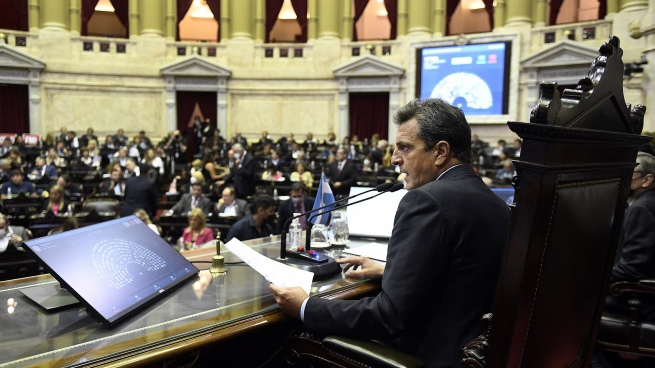Leaders and legislators from different political spaces agreed this Friday to highlight the broad support received in the Chamber of Deputies for the project that supports the agreement with the IMF for the restructuring of the debt contracted by former President Mauricio Macri, after more than thirteen hours of discussion.
After its sanction in Deputies, the objective of the ruling party is to convert into law the initiative that authorizes the Executive Power to sign a new understanding with the IMF before next Friday, for which this Monday it will begin its treatment in committee in the Senate. For the first time, Congress debates an agreement with the international organization.
With the positive vote of 202 legislators -against 37 negative and 13 abstentions-, the debate took place without major difficulties, although it had crosses and chicanes between the ruling party and the opposition throughout the session, in the framework of a day in which protesters generated disturbances in front of Congress and damage to the Parliament building, such as the office of Vice President Cristina Fernández de Kirchner, who was stoned.
Both from the ruling party and from the opposition, the importance of the consensus achieved to vote on the project was mentioned in several speeches.
Most of the positive votes were contributed by the benches of the Front of All and Together for Change, to which were added the legislators of the Federal, United Provinces and Ser interblocks; while, among the negative, there were votes from the Front of All, the left and the so-called libertarians,
The abstentions and the negative votes of the Frente de Todos corresponded to representatives of La Cámpora and social movements related to Kirchnerism.
At the end of the session, and as a balance, the ruling party highlighted the role of the president of the Chamber of Deputies, Sergio Massa, in the negotiations to unify the opinion of the project that supports the agreement with the IMF.
“It is important to go to a country where there is work, where we lower inflation, a country that all Argentines deserve”Deputy Aldo Leiva
In this sense, they highlighted that the head of the lower house “achieved that with 77 votes of his own strength the government approved with more than 200 votes the most difficult law since the arrival of the Frente de Todos to power.”
Both from the ruling party and from the opposition, the importance of the consensus achieved to vote on the project was mentioned in several speeches and they based their support on the need to avoid default, one of the most repeated phrases throughout the debate.
That premise was repeated by the head of radicalism and governor of Jujuy, Gerardo Morales, one of those who promoted the agreement with the ruling party from JXC and who was in Congress, while the project was debated on the premises.
“I came to greet the bloc and President Sergio Massa, who played a central role as articulator,” Morales remarked, in statements to the press, referring to his presence in the lower house.
“I came to greet the bloc and President Sergio Massa, who played a central role as articulator”Gerardo Morales
In any case, the ruling party downplays the differences within the Frente de Todos bloc and estimates that this situation will be resolved and the bench will continue to be unified for the coming sessions.
One of those who supported this theory was the former Minister of Defense, Agustín Rossi, who considered that “from now on, we will continue to find things in common to continue with the strong bloc.”
Along the same lines, deputy Carlos Selva (FDT-Buenos Aires) said that he trusts that it will be possible to “unify the criteria of the block again” to approve the laws that are currently in Congress.
“We couldn’t let go of a difficult decision that was trying to work out a deal against the clock.”Hugo Yaski
Also, the FDT deputy for Entre Ríos, Marcelo Casaretto, lowered the tone of the internal differences in the ruling party and said that “it is a minority today” and that, “in any case, this issue will begin to be discussed,” trusting that “we must maintain unity”.
“We have to get used to the fact that sometimes there is consensus and sometimes there is dissent, that is politics,” said the deputy of the Frente de Todos Aldo Leiva, in radio statements, stressing the importance of “going to a country where there is work, where we lower inflation, a country that all Argentines deserve”.
For deputy Hugo Yasky, it was possible “to cross the zone of turbulence and now the task is to try to build unity” and he maintained: “We need the unity of the Front of All”, pointing out that “we could not let go of the hand of a difficult decision that was trying to work out a deal against the clock.
“The divergence that the ruling party has was exposed, but also our commitment to society and the country to accompany a government”Ricardo Buryaile
In Together for Change, the debate on the project also generated differences and was reflected in the direction of the vote and also in some absences.
The only one of the JXC legislators who voted against the project, Ricardo López Murphy, substantiated the meaning of his vote, pointing out that “Kirchnerism got away with being an official and an opposition at the same time.”
In that sense, he said that “an indebtedness authorization was voted, but nothing to do with the doctrine of (Martín) Guzmán, where Congress assumed almost a parliamentary role” and estimated that this agreement “is not going to be fulfilled either” and that what was voted is “postponing the problem of default one or two more quarters.”
The project, approved in the lower house by 202 votes in favor, 37 against and 13 abstentions, has already been turned for final approval in the Senate
For his part, the radical deputy for Formosa, Ricardo Buryaile, told Télam that in the session “the divergence that the ruling party has was exposed, but also our commitment to society and the country to accompany a government that if it had not been for We would have fallen.”
Also, the president of the Federal interbloc, Alejandro ‘Topo’ Rodríguez, considered in statements to this agency that “the result of the vote shows that we act with the responsibility of a constructive opposition to prevent Argentina from going into default.”
The project, approved in the lower house by 202 votes in favor, 37 against and 13 abstentions, has already been turned over for final approval to the Senate and will begin to be discussed on Monday at 3:00 p.m. in the Budget Committee of the upper house, which will be attended by the Minister of Economy, Martín Guzmán.

















